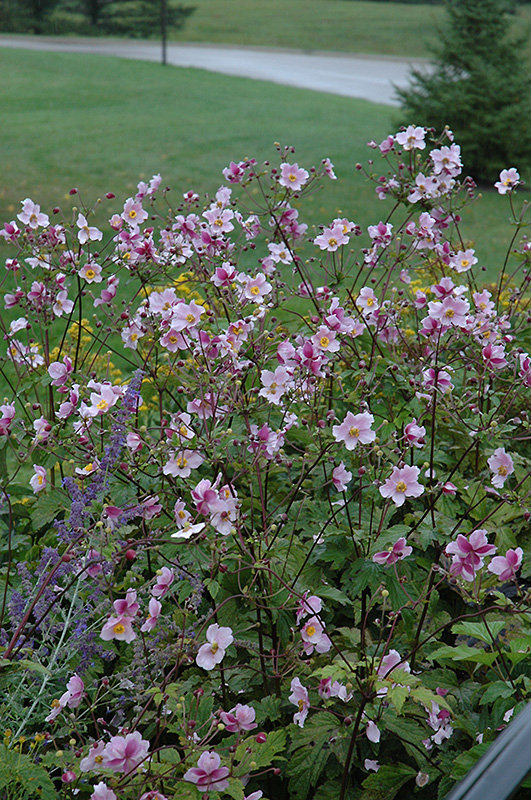Grapeleaf Anemone Anemone tomentosa 'Robustissima' Height: 4 feet Spread: 3 feet
Sunlight:
Hardiness Zone: 3 Description: A low mounded variety with forest green, lobed foliage, producing long, branching stems that present pink, buttercup flowers during the late summer and into the early fall; great for garden beds, wildflower gardens or fresh-cut arrangements Ornamental Features Grapeleaf Anemone has masses of beautiful shell pink buttercup flowers with yellow eyes and a pink reverse at the ends of the stems in late summer, which emerge from distinctive rose flower buds, and which are most effective when planted in groupings. The flowers are excellent for cutting. Its tomentose lobed leaves remain forest green in color throughout the season. The plum purple stems can be quite attractive. Landscape Attributes Grapeleaf Anemone is a dense herbaceous perennial with a mounded form. Its medium texture blends into the garden, but can always be balanced by a couple of finer or coarser plants for an effective composition. This plant will require occasional maintenance and upkeep, and is best cleaned up in early spring before it resumes active growth for the season. Deer don't particularly care for this plant and will usually leave it alone in favor of tastier treats. Gardeners should be aware of the following characteristic(s) that may warrant special consideration; Grapeleaf Anemone is recommended for the following landscape applications; Planting & Growing Grapeleaf Anemone will grow to be about 4 feet tall at maturity, with a spread of 3 feet. It has a low canopy with a typical clearance of 1 foot from the ground. It grows at a fast rate, and under ideal conditions can be expected to live for approximately 10 years. As an herbaceous perennial, this plant will usually die back to the crown each winter, and will regrow from the base each spring. Be careful not to disturb the crown in late winter when it may not be readily seen! This plant does best in full sun to partial shade. It prefers to grow in average to moist conditions, and shouldn't be allowed to dry out. It is not particular as to soil pH, but grows best in rich soils. It is somewhat tolerant of urban pollution. Consider applying a thick mulch around the root zone over the growing season to conserve soil moisture. This is a selected variety of a species not originally from North America. It can be propagated by division; however, as a cultivated variety, be aware that it may be subject to certain restrictions or prohibitions on propagation.![]()
![]()
![]()
![]()
![]()
![]()
![]()
![]()
![]()
![]()
![]()
![]()
Plant Finder
Characteristics
Applications
Features & Attributes


